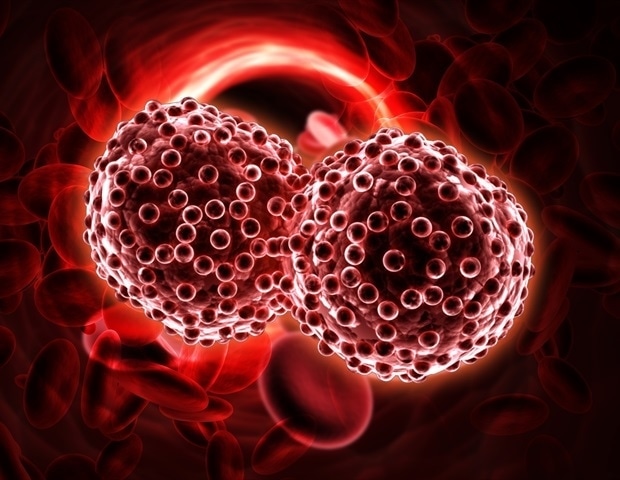
A examine from Washington College College of Medication in St. Louis suggests a method for stopping a persistent, slow-growing kind of blood most cancers from progressing to an aggressive type of leukemia. Proven is bone marrow from a mouse handled with a compound that blocks DUSP6, a key molecule within the transition from persistent to aggressive illness.
A sort of persistent leukemia can simmer for a few years. Some sufferers might have remedy to handle one of these blood most cancers — referred to as myeloproliferative neoplasms (MPN) — whereas others might undergo lengthy intervals of watchful ready. However for a small share of sufferers, the slower paced illness can rework into an aggressive most cancers, referred to as secondary acute myeloid leukemia, that has few efficient remedy choices. Little has been identified about how this transformation takes place.
However now, researchers at Washington College College of Medication in St. Louis have recognized an vital transition level within the shift from persistent to aggressive leukemia. They’ve proven that blocking a key molecule within the transition pathway prevents this harmful illness development in mice with fashions of the illness and in mice with tumors sampled from human sufferers.
The analysis seems Dec. 29 within the journal Nature Most cancers.
Secondary acute myeloid leukemia has a grim prognosis. Virtually each affected person who develops acute leukemia after a historical past of myeloproliferative neoplasms will die from the illness. Subsequently, a serious focus of our analysis is to higher perceive this conversion from persistent to aggressive illness and to develop higher therapies and, hopefully, prevention methods for these sufferers.”
Stephen T. Oh, MD, PhD, senior writer, affiliate professor of drugs and co-director of the Division of Hematology, Washington College College of Medication in St. Louis
The examine means that inhibiting this key transition molecule — referred to as DUSP6 — helps overcome the resistance that these cancers typically develop to JAK2 inhibitors, the remedy usually used to deal with them. JAK2 inhibitors are an anti-inflammatory remedy additionally used to deal with rheumatoid arthritis.
“These sufferers are generally handled with JAK2 inhibitors, however their illness progresses regardless of that remedy, so we’re additionally attempting to establish how the illness is ready to worsen even within the setting of JAK2 inhibition,” mentioned Oh, who treats sufferers at Siteman Most cancers Heart at Barnes-Jewish Hospital and Washington College College of Medication.
The researchers carried out a deep dive into the genetics of those tumors, each through the gradual persistent part and after the illness had remodeled into the aggressive type whereas sufferers have been taking JAK2 inhibitors. The DUSP6 gene stood out as extremely expressed within the 40 sufferers whose tumors have been analyzed on this examine.
Utilizing genetic methods to delete the DUSP6 gene prevented the transition to aggressive illness in mice with fashions of this most cancers. The researchers additionally examined a drug compound that inhibits DUSP6 and located that the compound — solely out there for animal analysis — stopped development of the persistent illness to the aggressive illness in two completely different mouse fashions of the most cancers and in mice with human tumors sampled from sufferers. Decreasing DUSP6 ranges each genetically and with a drug additionally lowered irritation in these fashions.
For the reason that drug that inhibits DUSP6 shouldn’t be out there for human scientific trials, Oh and his colleagues are occupied with exploring therapies that inhibit one other molecule that they discovered is activated downstream of DUSP6 and that they confirmed can be required to perpetuate the destructive results of DUSP6. There are medicine in scientific trials that inhibit this downstream molecule, often called RSK1. Oh’s group is occupied with investigating these medicine for his or her potential to dam the harmful transition from persistent to aggressive illness and tackle resistance to JAK2 inhibition.
“A future scientific trial may enroll myeloproliferative neoplasm sufferers who’re taking JAK2 inhibitors and, regardless of that, present proof of their illness worsening,” Oh mentioned. “At that time, we would add the kind of RSK inhibitor that is now in trials to their remedy to see if that helps block development of the illness into an aggressive secondary acute myeloid leukemia. A newly developed RKS inhibitor is in part 1 scientific trials for sufferers with breast most cancers, so we’re hopeful our work offers a promising basis for growing a brand new remedy technique for sufferers with this persistent blood most cancers.”
Supply:
Journal reference:
Kong, T., et al. (2022) DUSP6 mediates resistance to JAK2 inhibition and drives leukemic development. Nature Most cancers. doi.org/10.1038/s43018-022-00486-8.
